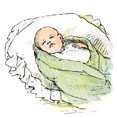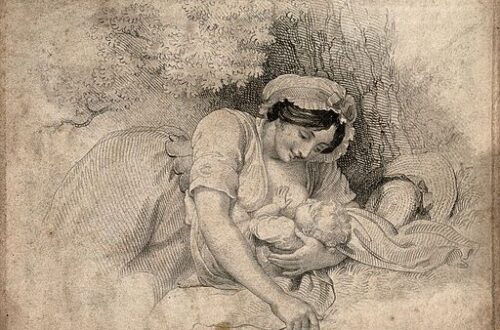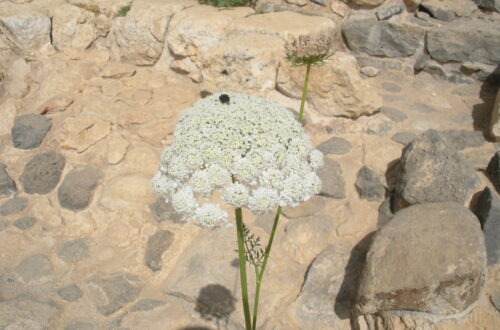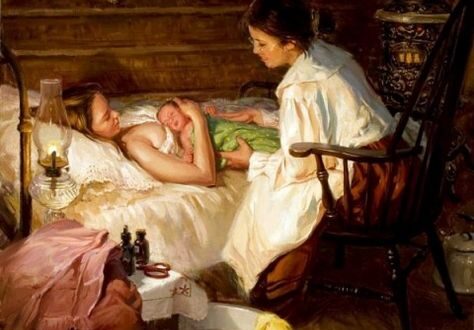One of the women I admire provided care to childbearing women in their homes. For four years I worked in a home birth practice that followed the principles of care taught by Dr. Beatrice Tucker.
Dr. Beatrice Tucker was the remarkable woman who directed the Chicago Maternity Center from 1931 to 1973. She had been the first woman resident doctor at the University of Chicago Lying-In Hospital in 1922.
She studied under Dr. J. DeLee who had opened the Chicago Maternity Center. It is ironic that Dr. Tucker once worked under Dr. DeLee.
As Dr. DeLee’s career progressed he promoted the use of forceps for delivery, twilight sleep (an amnesiac type medication) and episiotomies. He was highly influential in the developing field of obstetrics, and sadly he was outspoken in his disparagement of midwives.
Even though obstetricians were moving toward aggressive control of labor and birth, Dr. Tucker supported the natural progression of labor and birth. In her management of the Chicago Maternity Center she set a standard for safe home birth.
During the Maternity Center’s peak activity (between 1929 and 1941) an average of 360 births took place each month. During her tenure at the Chicago Maternity Center she participated in over 100,000 births.
The Tuscaloosa News (12/3/1975) ran a story about Dr. Tucker. The article begins: “Shortly after her 78th birthday, Dr. Beatrice E. Tucker reluctantly came out of quasi-retirement to deliver a baby at the mother’s home. It was a rather easy affair in a clean apartment . . .”

Later in the article she is quoted as saying “Most doctors have never seen a baby born at home and they don’t know how to do it.” Dr. Tucker was a strong woman willing to go against the current of medical trends to provide safe and economical care to women.
This post is part of Write28Days. To see the other posts in this series click here.



Thank you for this Carol.
Sadly, natural births are still not the great majority that it should be. Anesthetics are too wildly common, and pre-natal preparation not promoted enough.
For my three children (‘95, ‘98, ‘2001) I had to insist on natural birth and I prepared accordingly. Physical and mind exercises, including yoga, aquatic gymnastics, relaxation, visualization.
And I was happy to be able to give birth naturally and easily with only a midwife present. Unfortunately not at home. At the time, the health service in neither Spain nor France offered any Medicaid for home births. Which is an aberration considering that home births have been the rule for centuries all over the world and still are in many countries.
Breastfeeding is not generalized either in Western countries though the World Health Organization campaigns incessantly. Then people wonder why babies and small children are always sick and/or overweight !
Why is it that practices of giving birth and raising small children that were the norm in the ‘60’s were “forgotten” by Western cultures for 40 years !
Humanity is always striving to change in the name of progress but ends up complicating and in the end regressing ! Hope lies in our future generations who are on the right path to giving nature its rightful place back.
Wonderful to hear your birth stories, Susan. Breastfeeding is more successful when mother has fewer interventions/medications and when baby is placed skin to skin with her following birth. Hopefully we can encourage the younger generation to embrace a more natural approach to labor.
I was born to a 17 yr old, married almost a year. Delivered with forceps after letting her be in labor way too long, she and I both almost died. I am glad to see that women are getting better care and that there is still natural childbirth for those who can do it.
Our birth stories stay with us. Your mother has some painful memories. As you point out, interventions are sometimes necessary and it is important to have skilled and observant caregivers. Thank-you for visiting Rebecca.
I have a friend who is a midwife. We all have learned a lot from her stories and insights into home births. It takes a special person to do it and I admire them all!
This is a topic that is near and dear to my heart! My mom was a Lamaze instructor. We grew up with knowledge of the beautiful process of pregnancy and birth. When I needed a c-section for my first, I felt the loss of what I knew would’ve been better…but I bonded and nursed my baby post op, which God knew I needed. Later, I had a VBAC and although a homebirth would have been a dream, We made the best choices possible based on what was available in our area. I’m thankful for women like you and so many others who champion the cause!
I’m glad you were able to have a VBAC. All of my children were born by c-section. Like you my first pregnancy led to C/S. Second pregnancy was twins followed by smoldering DIC that landed me back in the hospital. I wasn’t suppose to have any more children but God graciously gave us another baby ten years later–again C/S. I learned so much from my experience and my daughters have benefited. All of their children were born with minimal intervention and one was born at home.